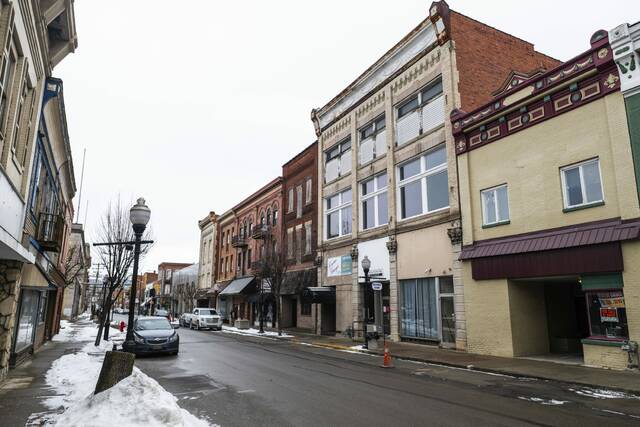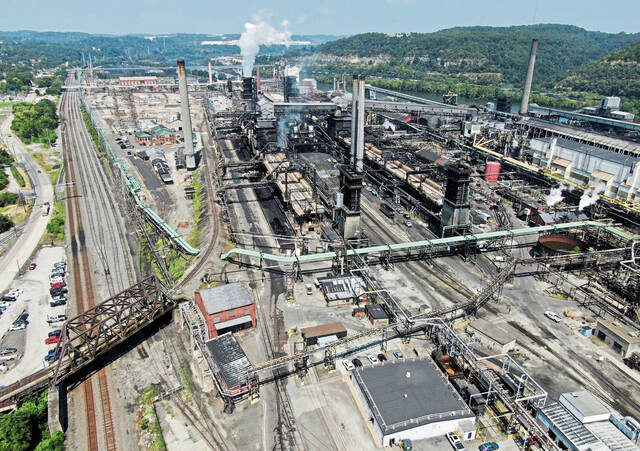A group of lawmakers from Western Pennsylvania is challenging Gov. Tom Wolf’s effort to make Pennsylvania a member of the Regional Greenhouse Gas Initiative (RGGI), saying the resulting carbon tax will hurt the state’s energy sector and consumers.
The legislators said Tuesday that Wolf does not have the authority to pursue RGGI membership unilaterally and must consult with the General Assembly.
“He does not have the authority to tax. It’s very basic,” said state Rep. Daryl Metcalfe, R-Cranberry, chairman of the House Environmental Resources and Energy Committee.
The lawmakers plan to introduce House Bill 2025 and Senate Bill 950, both of which would require legislative approval of Wolf’s October executive order instructing the state Department of Environmental Protection to join the RGGI.
“This unilateral attempt by the governor simply should not occur,” said state Sen. Joe Pittman, R-Indiana. “We seek to ensure that our constitutional separation of powers remains intact.”
Wolf committed Pennsylvania to RGGI membership in October, instructing the DEP to draft a regulation to present to the Environmental Quality Board by July 2020. Such membership is part of Wolf’s effort to reduce the state’s greenhouse gas emissions, which contribute to climate change.
In January, Wolf signed an executive order committing the state to reduce greenhouse gas emissions 26% by 2025 and by 80% by 2050. Those reductions would be compared to 2005 levels.
RGGI membership would require Pennsylvania’s electric power generators with a capacity of 25 megawatts or more to buy allowances equal to their carbon dioxide emission caps. The cap on CO2 emissions is set by RGGI for its nine member states — Connecticut, Delaware, Maine, Maryland, Massachusetts, New Hampshire, New York, Rhode Island and Vermont.
New Jersey left the cooperative in 2011 but is planning to rejoin in 2020.
To show compliance with the cap, power plants must purchase a credit, or “allowance,” for each ton of CO2 they emit. These purchases are made at quarterly auctions conducted by RGGI. Proceeds from the auctions are allocated back to the states for investment in energy efficiency and renewable sources of energy.
Currently, 165 facilities are governed by RGGI emissions allowance rules.
The lawmakers at Tuesday’s press conference said membership in the RGGI could be devastating for Pennsylvania’s coal-fired power plants, thermal coal producers and employees who work in the coal industry.
Among those affected locally would be the Conemaugh Generating Station and Homer City Generating Station, both in Indiana County, and the Keystone Generating Station in Armstrong County, said Rachel Gleason, executive director of the Pennsylvania Coal Alliance.
Gleason said natural gas power plants, including newer ones like the Tenaska Westmoreland Generating Station in South Huntingdon, also would be threatened by RGGI membership.
“Older natural gas power plants would suffer under the RGGI program,” she said.
State Rep. Pam Snyder, D-Carmichaels, said RGGI membership would have “far reaching and devastating impacts on the people I represent” in Greene, Washington and Fayette counties.
“RGGI puts southwestern Pennsylvania at a competitive disadvantage” because local energy producers could choose to move their facilities to non-RGGI states such as Ohio and West Virginia, Snyder said.
“The legislature should have the opportunity to weigh in on the decision to join RGGI,” she said.
The lawmakers noted that Pennsylvania already has reduced its carbon dioxide emissions in recent years without joining the RGGI.
Natural gas, which emits less carbon dioxide than coal, has largely replaced coal as the leading fuel for electricity generation in the state. What’s more, carbon dioxide emissions in the state fell by 26% from 2000 to 2016, according to an analysis by the Pittsburgh-based Allegheny Institute for Public Policy.
“We have achieved reductions greater than the RGGI states,” said state Rep. Jim Struzzi, R-Indiana.
Environmental groups reacted negatively to the lawmakers’ proposal to subject Wolf’s executive order to the legislative process.
“The Wolf administration has clear and considerable authority under existing law to establish a Pennsylvania program to control air pollution from power plants,” said Joseph Otis Minott, executive director of the Philadelphia-based Clean Air Council.
“Linking Pennsylvania’s program with the other independent state programs in RGGI will help lower compliance costs and provide flexibility to regulated entities as part of a larger marketplace,” he said.
Minott said it’s misleading to call the RGGI system a “tax.”
“Limiting carbon pollution from the power sector is an integral part of any serious attempt at combating climate change, and Pennsylvania must be part of the solution,” said Rob Altenburg, director of the Pittsburgh-based PennFuture Energy Center. “The legislature attempting to delay the process serves no purpose but to increase pollution.”
Also Tuesday, Metcalfe sent a letter to DEP Secretary Patrick McDonnell asking him to answer more than two dozen “unanswered questions regarding the governor’s unlawful executive order.”








